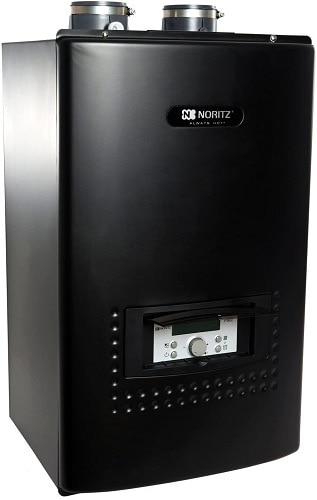Boiler vs Water Heater: What Are the Differences?
-

- Last updated:
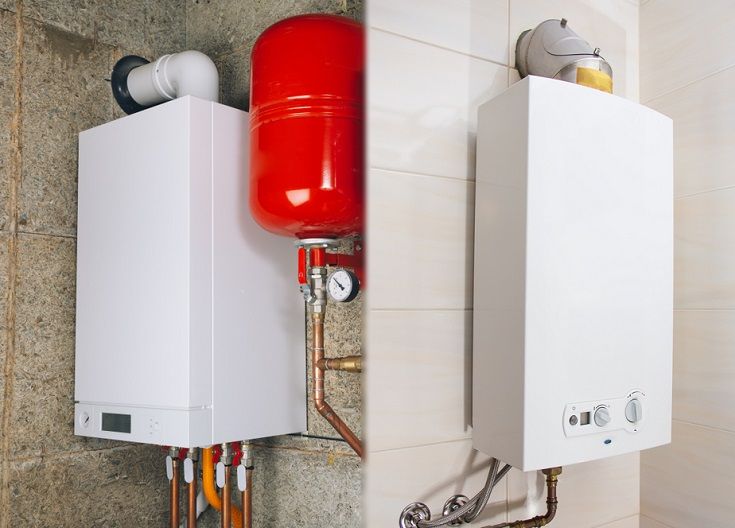
When you turn on the hot water in your home and proceed to use it for dishes, showering, laundry, or anything else, do you ever give any thought to where the heat comes from? Until there’s a problem, most of us don’t even consider it.
You’ve surely heard the terms boiler and water heater. Likely, you’ve even heard them used interchangeably. While both of them can provide your home with hot water, that’s about where the similarities end.
Does your house have a water heater or a boiler? Do you know the differences between them? We’re going to break down the dissimilarities between these two systems so that you can be more informed about where your hot water comes from and what you’ve got in your own home.
What’s a Water Heater?
The water heater is an aptly named device. It does exactly what it says: heats water.
Water heaters are built to supply your entire home with hot water. Any time you turn on a faucet, the water heater will send hot water through the pipes to your faucet so you can use it for whatever you need. Of course, there are several different types of water heaters that each heat and send the water a little differently, but they all perform the same basic function.
These devices are purpose-built for providing hot water; they don’t perform other functions. A water heater won’t heat your home, just your water.
How Does a Water Heater Work?
Water heaters are very simple. They either keep a tank of hot water ready or heat water on demand when you activate a hot water faucet, depending on the type of water heater you have. Then, they send the water down the faucet for use. That’s it!
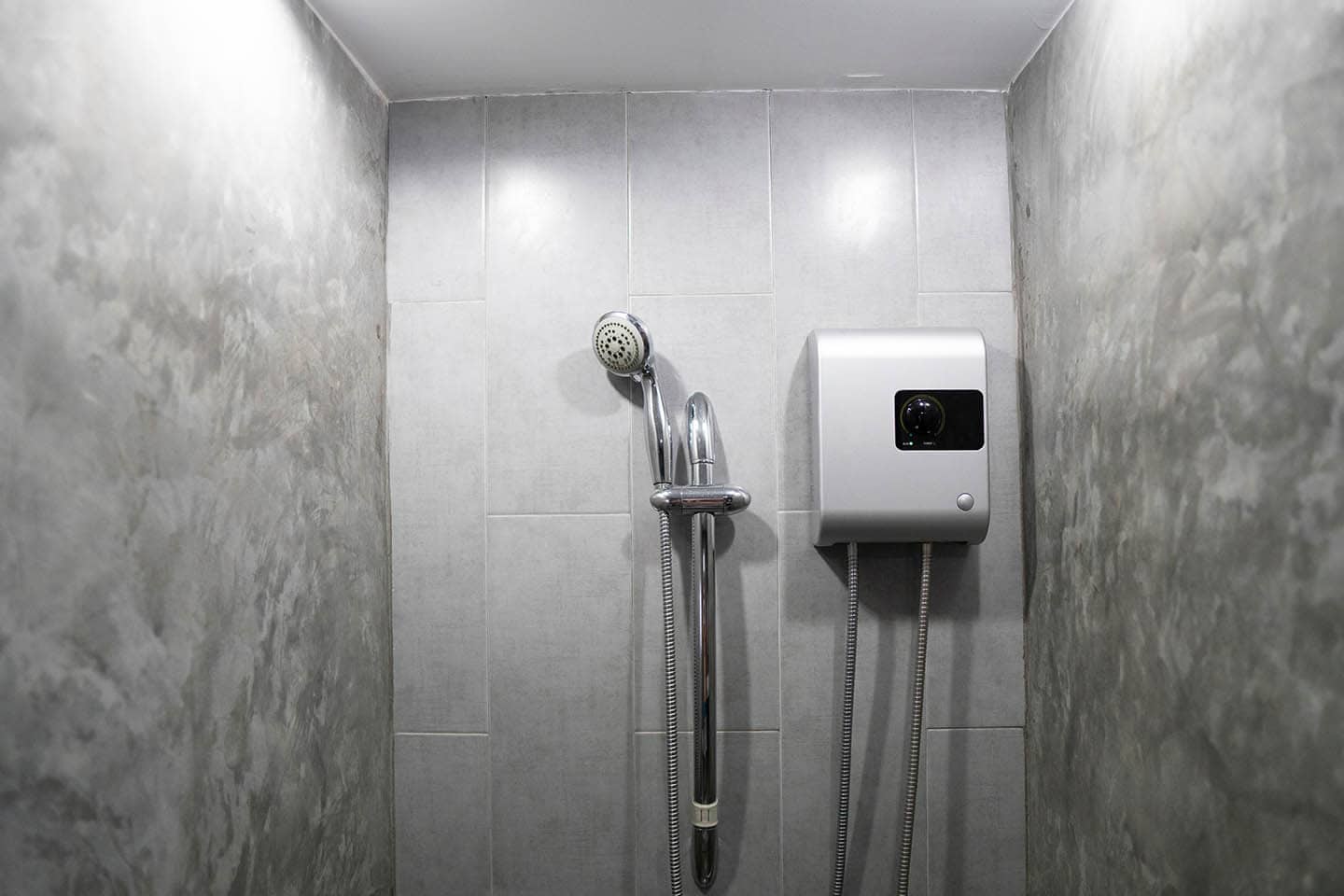
Types of Water Heaters
Traditionally, most water heaters used natural gas to heat a large tank of water that you would pull from whenever hot water was needed. But today, we have a lot more options. Water heaters can run with or without water tanks. They can also use different fuel sources now. Let’s take a look at the most common types of water heaters so you can get a better understanding of how these appliances work.
Fuel Source
In order to send hot water through your system, enough heat must be generated to warm that water up to an acceptable temperature. This requires a constant fuel source. Today, water heaters run on one of two main fuel sources: gas or electricity.
Gas
For many years, gas water heaters were about the only option. They use natural gas to fuel a fire that heats the water. Gas-powered water heaters are generally very efficient, so they’re usually cheaper to operate than an electric water heater. However, they’re usually more expensive upfront.
Electric
Electricity is renewable, unlike natural gas. Many modern water heaters run on electricity instead of natural gas. They don’t need flames or pilot lights like gas water heaters. They simply plug into an electrical outlet and will start heating water for your home.
Tank vs Tankless
Until recently, all water heaters used tanks. These tanks ranged from 10 to 60+ gallons. The tank would fill with water which would then get heated to the appropriate temperature. Once it reached the correct temperature, the water remained in the tank, being constantly heated to maintain the temperature, until it was ushered through the pipes to a faucet when needed.
Naturally, this can be a pretty wasteful process since you’re using a lot of energy to keep that water hot when it’s not even being used. Moreover, once you empty the hot water tank, you have to wait for more water to heat up before you can use the warm water again.
To make this process more efficient, the tank has been removed in a lot of modern setups.
Tankless water heaters simply heat the water when it’s needed. They don’t have any water holding tanks. When you turn on the hot water, the water heater will heat the water as it passes through, delivering an endless supply of hot water to your home.
One of Our Favorite Water Heaters
If you’re looking for a great water heater, one of our favorites is the Ecosmart ECO 18. It’s a tankless electric water heater that provides unlimited hot water; no more running the tank dry and waiting for a new tank to heat up! Plus, that means it’s small and compact, saving you space in your home. Even better, it’s equipped with self-modulating technology, which means that it only uses the amount of energy needed, saving you up to 60% on your water heating costs.
What’s a Boiler?
Boilers have been around for a long time. Remember those old radiator heaters? Those were powered by a boiler.
A boiler heats water in a similar way to a water heater. But a boiler doesn’t use that hot water for your faucets, although some can.
Boilers will send that hot water or steam through pipes that circulate your entire home. These pipes can lead to radiator heaters or even floor heating systems, allowing the boiler to act as the heating system for your entire home.
How Does a Boiler Work?
Boilers are run by a thermostat, just like any home heating system. When the thermostat senses a drop in temperature it turns the boiler on. The boiler then uses a fuel source such as gas or electric to heat the water in the boiler tank.
A boiler tank is a large tank that uses a fuel source to create heat using either fire or hot gasses. A web of pipes carrying water runs through the boiler tank. The heat from the fire or gasses will warm up the water inside of the pipes.
The hot water or steam is then sent through pipes that span the entire home. As it passes through the pipes, it makes its way through radiators and radiant floor heating systems. This warms the air in the house, raising the temperature. The water then circulates all the way back to the boiler again where it’s heated once again and the process repeats.
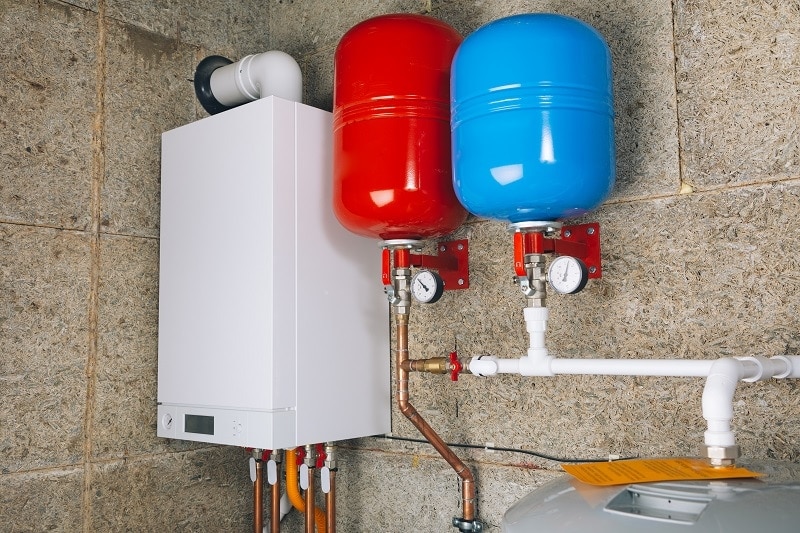
Types of Boilers
There are actually quite a few different types of boilers. These are commonly used in industrial applications as well as home systems. We’re not going to cover each of the different types of boilers, but we’re going to briefly discuss the main types you might use in your home.
Fuel Source
Just like water heaters, boilers use a fuel source to create heat. Today, you have three choices of fuel sources for your boiler: gas, oil, and electricity.
Gas
Gas boilers run on natural gas. They use a pilot light or electronic ignition to create a flame with the gas that heats the boiler. Gas boilers tend to be more expensive up front, but more efficient and inexpensive to run long term.
Oil
Oil boilers are a bit of a headache. You have to have the oil shipped in and it requires a separate tank. These cost more to install and to run than other types of boilers.
Electric
Electric boilers use electricity and heating elements to heat the water pipes rather than an open flame or hot gasses. This is great if you don’t have natural gas or don’t want to use it. However, electric boilers aren’t as efficient as gas-powered ones.
Heat Type
Though they’re called boilers, they don’t actually send boiling water through the pipes. Instead, they either send steam or hot water that’s high-pressure but not boiling.
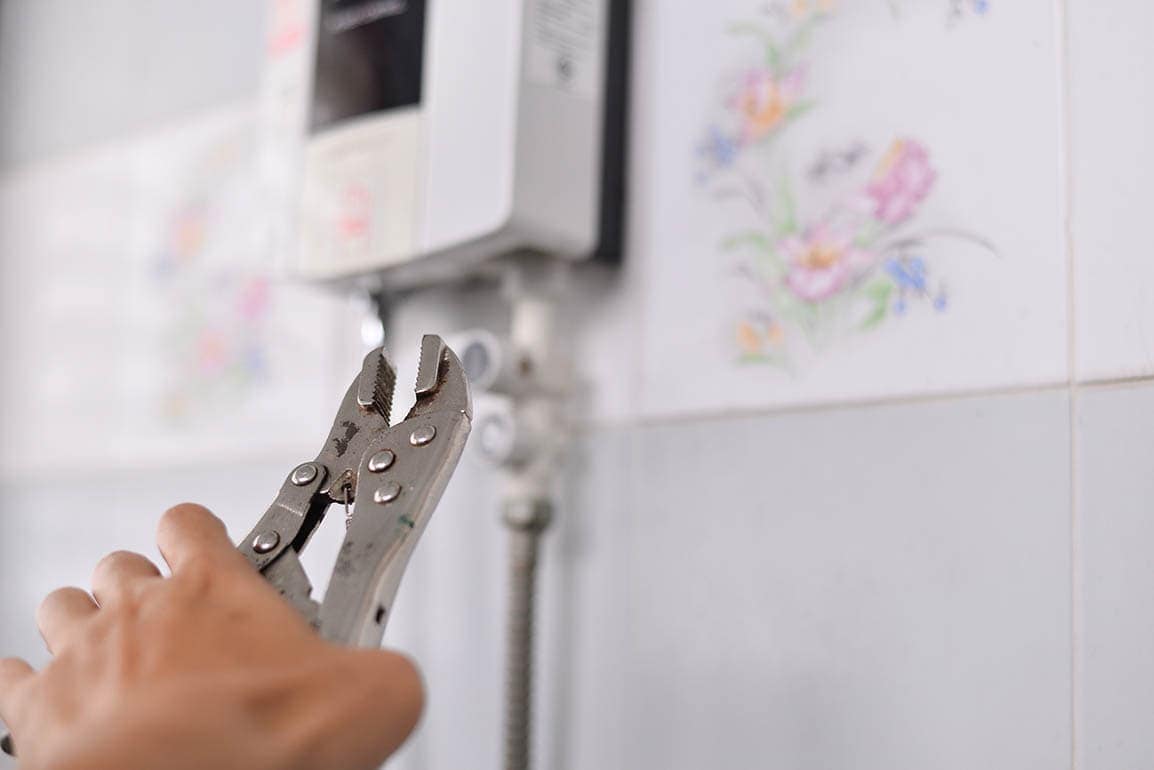
Water
This type of boiler heats the water to about 140-180 degrees Fahrenheit. But the water doesn’t boil because of the pressure. Water boilers are usually more efficient than steam boilers but they need an electric pump to then push the water through the pipes and circulate it through the home.
Steam
Steam boilers heat the water until it’s just steam. This increases the pressure inside the system, forcing the steam to circulate the pipes and radiators until it cools down and becomes water again on its way back to the boiler. The boiler will heat it once again to repeat the process.
Since it takes more energy to boil water into steam than to simply heat it, steam boilers aren’t generally as efficient as water boilers. But they also don’t need an electric pump thanks to the pressure generated by the steam, which circulates the steam through the pipes.
Standard vs Combination Boilers
Standard boilers are built to provide heat to a home through radiators and radiant floor heating. They do this by carrying hot water or steam through the pipes, allowing the heat to radiate through the house.
But combination boilers take it even further. These devices will also heat the water you use at your faucets.
Combination boilers come in two types: tankless coil systems and indirect systems.
Tankless coil systems
These boilers heat water instantly through the boiler’s heat exchanger. When you turn on the hot water faucet, it is warmed up instantly after being run through the heat exchanger. These are great because they don’t require tanks, so they don’t take up much space. They’re also very efficient in the cold months when the heat is on, though they’re quite inefficient during the summer months when the whole system must be used just to heat water.
Indirect systems
Indirect systems work similarly to a tankless coil system in that water is run over a heat exchanger. But once the water is warm, it’s then stored in a tank for use when needed. This makes it a much more efficient system in summer because the entire system doesn’t need to be activated each time you need hot water.
One of Our Favorite Boilers
Looking for a new boiler system for your home? We suggest the Noritz CB-199-DV-NG Combi Boiler. This combination boiler can provide the central heating and hot water needs for your entire home. It runs on natural gas so it’s efficient with an energy factor of 0.95. It delivers up to 9.2 gallons per minute of hot water at temperatures up to 140 degrees Fahrenheit. And it takes up to 80% less space than a regular water heater and floor-standing boiler.
Differences Between Water Heaters and Boilers
The main difference between water heaters and boilers is what they’re used for. Water heaters provide hot water to your home’s faucets and fixtures. Boilers use hot water to provide central heating for your home. Some boilers, called combination boilers, can also provide hot water to the faucets and fixtures, but not all.
Conclusion
Though boilers and water heaters may sound like similar devices, they serve quite different purposes. Water heaters simply heat water to provide you with hot water where you need it; faucets, showers, etc. Boilers, on the other hand, circulate hot water or steam through the home and use it to heat the entire house with radiators and radiant floor heating. Some combination boilers can also provide hot water to your home’s fixtures, replacing the water heater. While boilers and water heaters both perform very well at their given jobs, they’re not interchangeable. Make sure you pick the right device for your home and your needs.
Featured Image Credit: Left: Boiler, nikkytok, Shutterstock | Right: Heater, MStock00, Shutterstock
Contents



